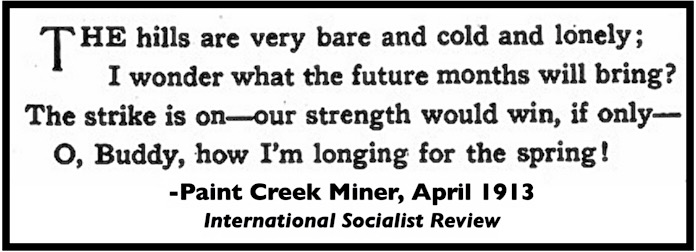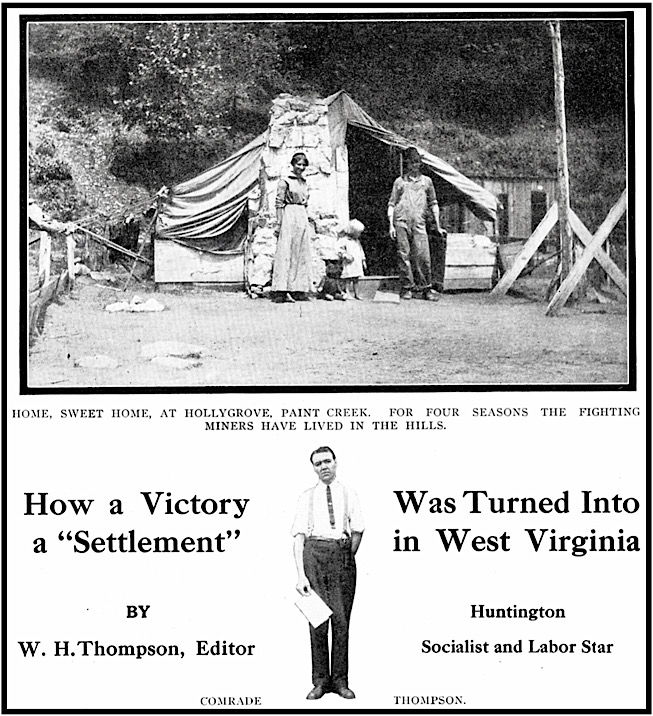 —————
—————
Hellraisers Journal – Friday July 4, 1913
West Virginia Coal Miners’ Victory Turned into “Settlement”-Part I
From the International Socialist Review of July 1913:
[Part I of III]
To those who have been actively engaged in the epochal struggle of the coal miners in this state the present status of affairs is anything but optimistic.
The miners after having put up a fight that won the admiration of the entire working class the country over, have lost their strike and are being driven sullenly back to the Coal Trust’s subterrean hells to produce coal for their brutal masters under the same conditions which have prevailed in the West Virginia coal fields for years, and against which these miners revolted over a year ago.
It is not my intention to give a recapitulation of the stirring events of the Paint Creek strike, but rather a hurried sketch of the manner in which a well earned victory was turned into an empty and meaningless settlement, by a combination of forces against which the miners found themselves helpless.
The coal diggers of the Kanawha valley have proven themselves to be as brave and loyal a set of men as ever established a picket line. They have stoically and uncomplainingly borne the barbaric and inhuman treatment to which they were subjected by the Coal Trust and its political creature-the state government. They had by the sheer force of solidarity, and in spite of the weakness of the antiquated tactics taught them by the officials of the United Mine Workers of America, brought the coal barons to their knees. The state government, too, had exhausted its ingenuity and failed to break the strike. There remained but one hope for the masters of the mines. That was to enlist in their behalf the United Mine Workers of America.
When in the course of these remarks I use the expression ”U. M. W. of A.,” it is meant to apply, not to the men who actually dig coal, but rather to the official oligarchy known as the National Executive Board, members of which were handling the strike in this state.
Overtures were evidently made to these representatives by Governor H. D. Hatfield, acting for the coal autocracy. An agreement was reached, and the three organizations, viz: the Coal Trust, the State government and the U. M. W. of A., acting co-operatively, played the last card which won for the mine owners that which they would have never gained unaided by their last ally.
Everything being “understood” and agreed upon, Hatfield made public what he termed a “proposal for the settlement of the Kanawha strike.”
The proposal made no mention of the three cardinal demands of the miners the elimination of the hated guard system, the right to belong to a union and the payment of the “Kanawha Scale” of wages. In fact it offered absolutely nothing in the way of concessions from the operators-merely insisting-when sheared of its luxuriant verbosity-that the miners return to work under the same conditions that existed before they struck-if the mine owners would let them.
The U. M. W. of A. called a delegate convention to act upon the proposal, while the operators immediately notified the governor that they would accept it. The miners’ delegates, called from the camps up in the hills, were unanimous in treating the “proposal” as a huge joke. It was a thing of emptiness-offering them nothing but what they could have secured at any time since the strike began. Judge then their surprise when upon being called to order by their National officials they found that these leaders were seriously advocating the acceptance of the proposition!
The delegates voiced their objections so strenuously that the leaders decided that a whole lot of “educating” must be done before the delegates could be persuaded to accept the raw mess offered them.
A campaign of speechmaking began and for three days the convention was compelled to hear exhortations favoring the acceptance of the proposal, delivered by everybody interested in its acceptance-from Governor Hatfield down to the paid attorneys for the U. M. W. of A.
All this being unavailing, on the third day of the convention, Director Hatfield issued his famous (now infamous) 36-hour ultimatum, which gave the miners their choice of returning to work on the terms dictated by him or being immediately deported from the state.
Of course this threat had little effect upon the delegates. They had fought and beaten the army of murderous mine guards, faced machine guns in action and successfully defied the state Cossacks-threats were the smallest of their worries. But with the “officials” in charge it was different. The governor’s threat said to them in so many words: “You are slow in carrying out your part of the bargain-hurry.”
[Emphasis added.]
~~~~~~~~~~~~~~~~~~~~~~~~~
SOURCE & IMAGES
Quote Ralph Chaplin, WV Miners Longing for the Spring,
Leaves, Paint Creek Miner, ISR p736, Apr 1913
https://www.marxists.org/history/usa/pubs/isr/v13n10-apr-1913-ISR-riaz-ocr.pdf
International Socialist Review
(Chicago, Illinois)
-July 1913, p12-17
https://www.marxists.org/history/usa/pubs/isr/v14n01-jul-1913-ISR-riaz-ocr.pdf
See also:
Locomotive Firemen’s Magazine, Volume 55
Brotherhood of Locomotive Fireman, 1913
-July 1913, pages 51-62
(search: west virginia miners strike)
Note: many photos including: JP White, Frank Hayes, James Craigo,
Alfred Collins, Charles Williams, S. C. Coll, James Pettry, Frank Keeney,
C. G. Griffiths, Thomas Cairns, Militiamen, Tent Colonies, Children-some
with new shoes and some barefoot in winter, Eskdale v Bayonets,
https://books.google.com/books?id=UnYWAAAAYAAJ
“Committee Condemns W. Va. Mine Owners”:
Debs, Germer and Berger Report
From West Virginia History, Volume 52 (1993), pp. 19-26
https://archive.wvculture.org/history/journal_wvh/wvh52-2.html
Miners’ Magazine (Western Federation of Miners) of June 19, 1913
“Report of Debs, Berger, Germer on West Virginia”
https://books.google.com/books?id=BT4tAQAAMAAJ&pg=RA4-PA6&dq=debs+berger+germer+west+virginia+1913&hl=en&newbks=1&newbks_redir=0&sa=X&ved=2ahUKEwiUwJaYufr_AhWdlWoFHXzhD_IQ6AF6BAgEEAI#v=onepage&q=debs%20berger%20germer%20west%20virginia%201913&f=false
The Huntington WV Socialist and Labor Star of June 6, 1913
Note: use next-issue button to read more on WV Strike Settlement
https://chroniclingamerica.loc.gov/lccn/sn85059765/1913-06-06/ed-1/seq-1/
The Wheeling Majority of May 15, 1913
Note: use next-issue button.
https://chroniclingamerica.loc.gov/lccn/sn86092530/1913-05-15/ed-1/seq-1/
Tag: EVD Berger Germer Investigation of Conditions
in West Virginia for SPA NEC 1913
https://weneverforget.org/tag/evd-berger-germer-investigation-of-conditions-in-west-virginia-for-spa-nec-1913/
Tag: Senate Investigation of Paint Creek Coal Fields of West Virginia of 1913
https://weneverforget.org/tag/senate-investigation-of-paint-creek-coal-fields-of-west-virginia-of-1913/
Tag: Paint Creek-Cabin Creek Strike of 1912-1913
https://weneverforget.org/tag/paint-creek-cabin-creek-strike-of-1912-1913/
~~~~~~~~~~~~~~~~~~~~~~~~~

